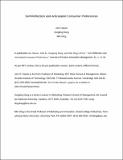Self-Reflection and Articulated Consumer Preferences
Author(s)
Hauser, John R.; Dong, Songting; Ding, Min
DownloadHauser_Self-reflection.pdf (1.478Mb)
OPEN_ACCESS_POLICY
Open Access Policy
Creative Commons Attribution-Noncommercial-Share Alike
Terms of use
Metadata
Show full item recordAbstract
Accurate measurement of consumer preferences reduces development costs and leads to successful products. Some product-development teams use quantitative methods such as conjoint analysis or structured methods such as Casemap. Other product-development teams rely on unstructured methods such as direct conversations with consumers, focus groups, or qualitative interviews. All methods assume that measured consumer preferences endure and are relevant for consumers' marketplace decisions. This article suggests that if consumers are not first given tasks to encourage preference self-reflection, unstructured methods may not measure accurate and enduring preferences. This paper provides evidence that consumers learn their preferences as they make realistic decisions. Sufficiently challenging decision tasks encourage preference self-reflection which, in turn, leads to more accurate and enduring measures. Evidence suggests further that if consumers are asked to articulate preferences before self-reflection, then that articulation interferes with consumers' abilities to articulate preferences even after they have a chance to self-reflect. The evidence that self-reflection enhances accuracy is based on experiments in the automotive and mobile phone markets. Consumers completed three rotated incentive-aligned preference measurement methods (revealed-preference measures [as in conjoint analysis], a structured method [Casemap], and an unstructured preference-articulation method). The stimuli were designed to be managerially relevant and realistic (53 aspects in automobiles, 22 aspects for mobile phones) so that consumers' decisions approximated in vivo decisions. One to three weeks later, consumers were asked which automobiles (or mobile phones) they would consider. Qualitative comments and response times are consistent with the implications of the measures of predictive ability.
Date issued
2014-01Department
Sloan School of ManagementJournal
Journal of Product Innovation Management
Publisher
John Wiley & Sons, Inc
Citation
Hauser, John R., Songting Dong, and Min Ding. “Self-Reflection and Articulated Consumer Preferences.” J Prod Innov Manag 31, no. 1 (October 4, 2013): 17–32.
Version: Author's final manuscript
ISSN
07376782